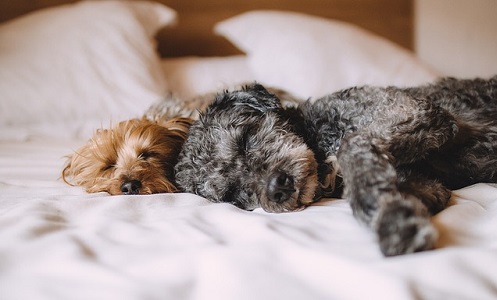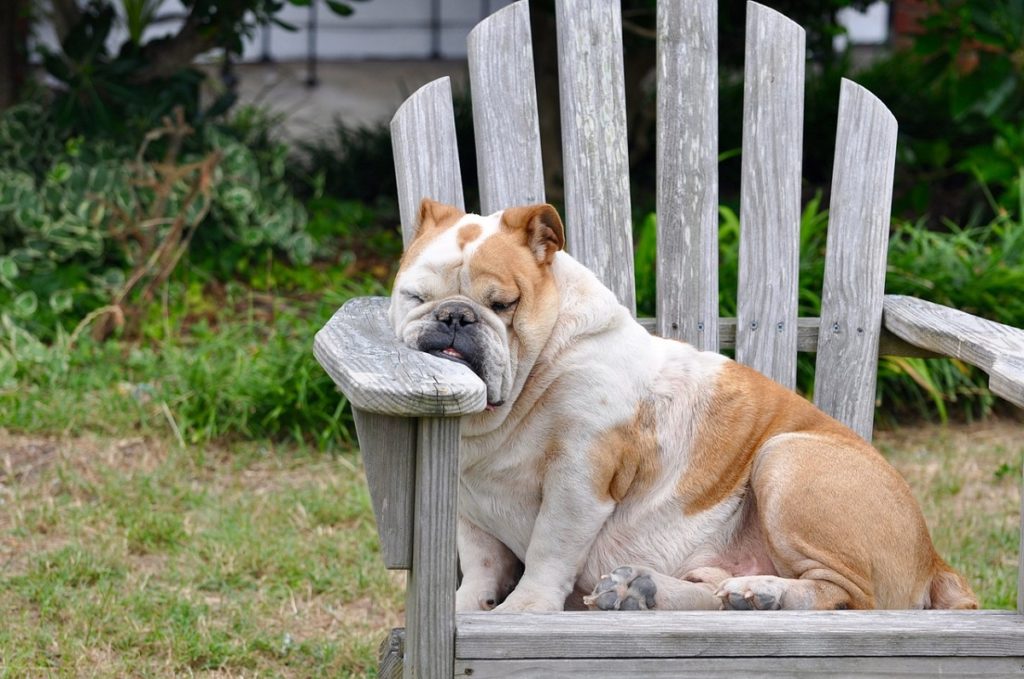If you’re one of those people who can only fall asleep with your dog in bed with you, then you’re probably already used to his snoring habits.
Chance are, your dog’s snoring is perfectly normal, but there are times when it can be a sign of an underlying medical condition. When is it time to take your dog to the vet? Why is he snoring? How can I help him sleep better? Here is everything you need to know about dog snoring.
What Causes Dog Snoring?
Anatomically speaking, snoring is a noise caused by the vibration of the soft tissues in your dog’s throat and mouth. The vibration arises when there is a disruption of the normal flow of air within your dog’s respiratory system. Here are a few of the causes behind dog snoring.
Breathing
Dog snoring generally occurs when air movement is restricted in the nasal passageways or throat. As you’ll read below, there could be several factors that cause this to happen. Serious breathing conditions, such as hypothyroidism and sleep apnea, although rare, can also lead to snoring.
A Congestion
Dogs can catch colds and become congested just like humans do. Some of the symptoms of a cold include canine inflammation, irritation, runny noses, dog sneezing, wheezing, and snoring. There’s no cure for a cold, so if this is why your dog is snoring, you may just have to ride out the noise until his nostrils clear up and he’s feeling better.
Allergies
Just like with humans, dogs can suffer from allergies. Dust, weed and tree pollen, dander, and smoke can irritate your dog’s respiratory system and make it more difficult for him to breathe. Allergies can affect your dog’s snoring because it can cause the tissues in his mouth to swell. Your dog may also be dealing with watery nasal discharge, which can cause heavy breathing or panting in dogs. If you start seeing signs of dog allergies, especially labored breathing, then you may want to speak with your vet about medications to alleviate the symptoms and potentially reduce his snoring. Food allergies in dogs can lead to more serious symptoms besides just snoring.
Aspergillosis, or Fungal Disease
When your dog happens to inhale mold spores, which are found in hay, grass, and compost piles, it can cause breathing difficulties. These spores enter the body through the lining of the nasal cavity, and lead to irritation and inflammation, which restricts a dog’s airways.
Cigarette Smoke and Snoring
 If you smoke, it could be affecting your dog. Dogs that are exposed to frequent or constant cigarette smoke will be more prone to snoring. The chemicals and toxins found in tobacco can irritate your dog. They may also put him at a greater risk of developing allergies and serious canine respiratory infections. If your dog’s snoring is due to tobacco smoke, it’ll stop if you quit smoking or, at a minimum, stop in the house.
If you smoke, it could be affecting your dog. Dogs that are exposed to frequent or constant cigarette smoke will be more prone to snoring. The chemicals and toxins found in tobacco can irritate your dog. They may also put him at a greater risk of developing allergies and serious canine respiratory infections. If your dog’s snoring is due to tobacco smoke, it’ll stop if you quit smoking or, at a minimum, stop in the house.
Dental Issues
A throat infection or growth in your dog’s mouth can also restrict your dog’s airways and cause snoring. These types of issues can become more serious and require a vet visit immediately.
Hypothyroidism
If your dog has hypothyroidism, he may be suffering from other issues beyond snoring. These may include loss or thinning hair, a dull coat, excessive shedding, scaly skin, weight gain, reduced activity, and a lower ability to tolerate the cold. Your vet may prescribe medication or suggest medication or hormone supplements to fix the issue and reduce his snoring.
Medications
Any time your dog begins a new medication, make sure you talk with his vet about potential side effects. Some pain relievers may cause his throat to relax more than usual, which can lead to snoring. If the medication is the culprit, but essential to your dog’s health, then you’ll have to deal with the snoring. Again, talk with your vet to learn about your possible options for improving the snoring situation.
Obesity
One of the most common causes of snoring in dogs is weight issues. When a dog is overweight or obese, fat can also collect in his throat, which blocks the airways and causes snoring. This can be extremely dangerous, because it can lead to the tracheal collapse in dogs. Of course, canine obesity can lead to many other issues besides snoring, so if you know that your dog is otherwise healthy, but has put on a few pounds, then work on reducing his weight. You can talk to your vet about a weight management plan for your dog and the appropriate weight for your dog’s breed.
Physical Obstruction
Sometimes a piece of debris can get stuck in your dog’s throat or nasal passage, making breathing more difficult. It might not be to the degree that he’s choking, but if he does have a physical obstruction, you might also notice your dog coughing a bit more than usual. If you know that your dog has been chewing on a tennis ball or rawhide, then call your vet immediately to remediate the situation.
Predisposition
If you have an English Bulldog, Shih Tzu, Boxer, or Pug, then you’re probably used to loud and heavy breathing. Breeds that are brachycephalic typically have a broad, short skull and a short snout. This means their airways are shorter and may have more trouble moving air in and out. While smaller breeds are more susceptible to snoring, that doesn’t mean you can ignore it, still check with your vet if you’re concerned because there still may be underlying breathing issues present. In case you are wondering though, here are a few of the breeds that are predisposed to snoring:
- Pug – Pugs are prone to brachycephalic syndrome, which can make breathing difficult. So, while they are small, they can also be loud as well.
- Bulldog – A bulldog’s flat face and shorter airways can also make breathing a challenge. You probably already know that snoring isn’t the only noise a bulldog will make; they can be quite noisy, and produce frequent, audible grunts and snorts too.
- Black Russian Terrier – This breed can be pretty high maintenance. Their long hair needs to be regularly brushed and you’ll have to dry off his beard whenever he drinks, snoring comes with the territory of owning a black Russian terrier as well.
- Pekingese – Pekingese can suffer from breathing issues, such as snoring. They may even suffer from acute respiratory attacks that can cause loss of consciousness if not monitored.
- Clumber Spaniel – These dogs tend to snore much more than the average breed. Clumber Spaniels are prone to a heart condition called canine dilated cardiomyopathy (DCM), which can eventually lead to breathing complications.
- Boston Terrier – As a brachycephalic breed, Boston Terriers are very likely to snore while sleeping. This breed can suffer from brachycephalic syndrome, which can also cause frequent wheezing, coughing, and gagging.
Sleeping Positions
You may notice that your dog may sleep soundly one minute, then be snoring the next. This is likely due to his sleeping position. If your dog sleeps on his back, his tongue can partially block his throat and airways, causing him to snore.
Is It Normal?
Typically, snoring is completely normal and harmless. If your dog has recently begun to snore and is showing symptoms of other illnesses or a disorder, contact your vet immediately.
When Should I Seek Medical Help for My Dog?
For the most part, you do not need to worry about your dog’s snoring habits. However, if his snoring is literally keeping you up at night, then you might want to consult your vet—especially if your dog is not a brachycephalic breed, which is susceptible to the condition.
 Snoring can sometimes be associated with more serious health issues in dogs. For example, sleep apnea in dogs is often related to high blood pressure. If your dog has sleep apnea, which may seem like extreme snoring, he may stop breathing for short periods of time during the night, leading to very unrestful sleep.
Snoring can sometimes be associated with more serious health issues in dogs. For example, sleep apnea in dogs is often related to high blood pressure. If your dog has sleep apnea, which may seem like extreme snoring, he may stop breathing for short periods of time during the night, leading to very unrestful sleep.
When you take your dog into the vet, they may ask about his overall health. Your vet might inspect your dog’s nose and throat to make sure there are no infections or obstructions. You may also be asked to describe the snoring; to make it easier on you, the next time your dog is snoring, record it on your phone, so your vet can more accurately come to a conclusive diagnosis of the underlying issue.
The best time to take your dog to the vet due to snoring is if it is unusual for him, if it starts abruptly, or if it’s getting worse. If your dog is generally healthy and active, and he has always snored, then there is a low chance that something serious is wrong.
What Can I Do?
If your dog has no apparent serious issues that are causing the snoring—but it’s still keeping you up at night—there are some things you can do to reduce his snoring. You can explore possible solutions with your vet, but here are a few simple solutions to help your household sleep better at night.
Adjust Your Dog’s Sleeping Position
A round dog bed gives your dog more room to sleep in a “curled up” position (rather than on his back), which can help expand his air passages. Propping his head up with a pillow while he sleeps or rolling him back onto his side may also help him get some rest and breathe better.
Change Your Air Filter
If your dog’s snoring is due to allergies, then you may want to change the air filters in your home. These will clear the air of irritants and help your furry friend get some rest.
Limit Exposure to Allergens
Keep your home as free of dust as possible. Clean and dust your home and vacuum carpets regularly, especially if your dog sheds frequently. When it comes to outdoor allergens, try to time walks when pollen levels and auto traffic are low.
Quit Smoking
Because tobacco smoke can greatly affect your dog’s snoring, quitting smoking should illuminate the problem of snoring. It’s also better for his—and your own—general health (including a decreased risk of cancer). If you can’t give up smoking, make it a point to only smoke outside where your dog will be less affected by the toxins.
Start an Exercise Regimen
If your dog is overweight, exercise can help him lose weight and will aide in a better night’s sleep. Maintaining a proper weight will also do wonders for your dog’s health overall.
Switch His Sleeping Spots
The allergens in one room of your house might differ from another. If your dog’s bed is located in one spot, move it somewhere else to see if it helps. Another solution is to make sure you’re washing his bedding once every two weeks (or more frequently if you know that he suffers from allergies).
Try a Humidifier
Some vets will suggest using a humidifier at night to increase the moisture in the air and lubricate your dog’s nasal passageways and airways. Humidifiers will help you sleep better at night as well.
Try out a few of these solutions for a week or two, and see if your dog’s snoring improves. If you still don’t notice a difference, it may be time to see your vet and get their input.
In extreme situations, surgery may be required to fully correct the issue. Usually, this measure is only performed on younger dogs, because local anesthesia needs to be used.
Snoring itself is probably not going to be harmful for your dog, but since it can be a symptom of a more serious issue, make sure you monitor any changes to his overall health. If you suspect that his snoring isn’t normal for any reason, contact your vet. You’ll likely get a better night’s sleep with a peace of mind that your dog is simply getting his own version of “peaceful” sleep.
Sources:
- “Does Your Dog Have a Snoring Problem?” PetMD, 24 Mar. 2017, www.petmd.com/dog/conditions/respiratory/does-your-dog-have-snoring-problem.
- Erb, Samantha. “8 Dangerous Reasons Your Dog Snores.” BarkPost, 14 Jan. 2019, www.barkpost.com/discover/dangerous-dog-snores/.
- Link, Tim. “Is Your Dog Snoring? Do All Dogs Snore?” Dogster, 10 July 2017, www.dogster.com/lifestyle/dog-behavior-health-snoring-dogs-snore.




